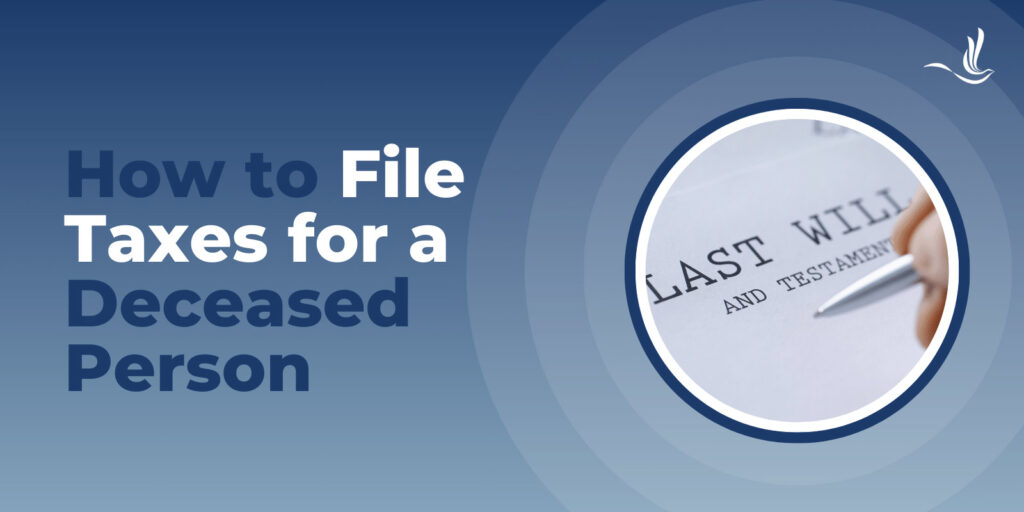
Most do not realize that after a loved one passes away, it’s typically the responsibility of the surviving spouse or representative to file a final tax return on their behalf. Filing taxes for a deceased person can be a complex and emotionally challenging task. However, it is essential to ensure that the decedent’s financial matters are properly handled. It’s also important to ensure their estate is settled in accordance with the law. In this article, we will guide you through the steps and considerations involved in filing taxes for a deceased person.
Who is responsible for filing the decedent’s tax return?
Filing a tax return for a deceased taxpayer is typically the responsibility of the deceased person’s executor or administrator, if one has been appointed. However, if the taxpayer was married, their spouse can file a joint tax return for the year they died. In this scenario, the surviving spouse will be able to claim the full standard deduction and use the married filing jointly tax bracket and tax rates.
If a court-appointed representative is handling the final tax return, they will need to attach a copy of the court document to the return. If a representative is handling a return, but not through the court, they need to include IRS Form 1310, Statement of Person Claiming Refund Due a Deceased Taxpayer, if they plan to claim a refund.
Who is responsible for paying the decedent’s taxes?
The executor or administrator is responsible for filing the deceased person’s final individual income tax return. Income will either be taxed on the final return, on the tax return of any beneficiaries who have earned income through the passing of the taxpayer, or on the estate or trust’s tax return.
Do I have to indicate on the return that the taxpayer is deceased?
It is important to indicate that you are filing a return for someone who is no longer living. If you are e-filing the return, the tax software you use should allow you to indicate this through a series of questions. If you are filing a paper tax return, you should simply print the word “deceased,” the deceased taxpayer’s name and their date of death on the top of the paper return.
How is income reported on a deceased person’s tax return?
Only income earned between the first day of the year and the date of death needs to be reported. For example, let’s say the deceased taxpayer held a saving’s that accrued interest. If they died on August 1, you only need to report the interest earned from January 1 to August 1. The interest earned from August 2 through December 31 may be taxable income to the beneficiary of the account. Alternatively, it can be considered taxable income to the estate if there is one.
Beneficiaries are typically not subject to income tax on money or property that they inherit. However, they are subject to taxation if the inherited asset earns interest or income. One exception, however, is money in a traditional IRA, employer-sponsored retirement plans like 401(k)s and 403(b)s, and annuities. These are treated as income and are taxed to the beneficiaries. The amount of time the account has been open also affects how it is taxed. If you inherit a Roth IRA or Roth 401(k), you won’t be taxed on inherited Roth distributions if the account has been open for at least five years at the time of death.
Keep in mind that for larger estates, it may be necessary to file an estate tax return. Some estates are subject to federal estate tax, depending on their net value. In 2023, estates valued at $12,920,000 or more are subject to this tax. There may also be state estate taxes to pay.
What if the decedent has debts that were left unpaid?
Generally, before distributing assets to heirs, the estate’s debts and taxes must be settled. These include funeral expenses, outstanding bills, and any taxes owed by the deceased person. However, the debt may go unpaid if the estate cannot cover the debts and there is no survivor who shared the responsibility of the debt.
Tax Help for Those Filing a Return for a Deceased Taxpayer
Filing taxes for a deceased person can be a daunting process. However, it’s a crucial step in settling their affairs and distributing their estate properly. Seeking professional guidance and being diligent in your record-keeping can help navigate this challenging task. It can also ensure that the deceased person’s financial matters are resolved in accordance with the law. Optima Tax Relief is the nation’s leading tax resolution firm with over $1 billion in resolved tax liabilities.
If You Need Tax Help, Contact Us Today for a Free Consultation